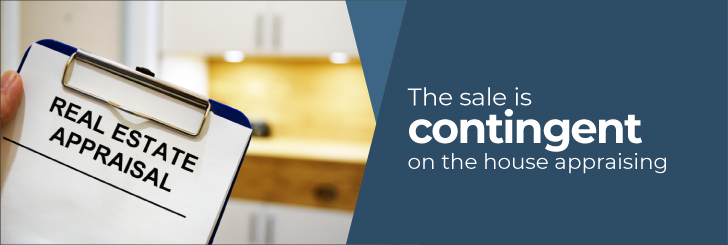Maybe you’re browsing a real estate listings website, or looking at homes on the market in your neighborhood, and you see a property listed as either “contingent” or “pending.” Or maybe you’ve just accepted an offer on your home and your agent has just changed the status of your listing, and you’re wondering what’s next. You might (rightfully) assume in either case that the house is as good as sold. But if you are really interested in that property, or if you’re the seller and aren’t completely confident that the sale go through, the specific listing status of the property can be very important.
Before we get into the differences of pending and contingent statuses, let’s break down the real estate jargon. By definition, when something is “contingent” it is “dependent on or conditioned by something else.” That means that in order for something to happen—a sale for instance—something else must happen first, or a certain condition must first be met. When something is “pending,” on the other hand, particularly in regard to property sales, it generally means it is “imminent”— i.e., in all likelihood, the sale will happen.

With the variety and scale of home sales—according to Florida Realtors, almost 300,000 homes were sold here last year alone—navigating the long stage between offer and closing can be complicated. In this post, we’ll discuss how and why properties are given different statuses along the way, and what you can do to ensure that, whether buying or selling, you make a deal that works for you.
Contingent Sale: More Work to be Done

Common Contingencies
While most contingencies are designed to protect the buyer from making a bad purchase, some are requested on behalf of the seller. Here are some common contingencies.
• Financing. The sale is dependent on the buyer securing financing, usually within a certain amount of time. For instance, if a mortgage company denies the buyer’s loan application, the seller has the right to cancel the contract, and the buyer may also have their escrow funds released back to them.
• Buyer Selling Their Current Home. In this case, the sale is contingent on the buyer selling their current home, often because they need to do so to get financing. Sellers sometimes prefer to avoid this contingency because it puts control of the sale out of their hands. The seller will have to rely on the ability of the buyer to list and successfully sell their home in a timely manner.
• Seller Securing Another Home. Here the sale is contingent on the seller buying another home. This is less common because many buyers are hesitant to rest the purchase of their home on such a condition.

• Appraisal. The sale is contingent on the house appraising for at least the value of the accepted offer. This is necessary for mortgage companies to underwrite loans, but is common even in cases where the seller is not using financing.
• Inspection plus Additional Inspections. The sale is contingent on the house passing a general inspection, though sometimes the buyer might want to include additional items such as inspections for lead, radon, or termites. If issues arise in the course of the inspections, the buyer and seller have several options. They can renegotiate the price, the seller can make certain repairs, or the buyer can terminate the contract.
• Title. The sale is contingent on a clean title, i.e. one without liens (such as for unpaid tax bills) that is deeded to the seller and only the seller. This ensures that the deed can be transferred without issue to the new owner.
Lastly, there are ways to deal with less-than-desirable contingencies. For instance, if you’re a seller and the sale is contingent on the buyer selling their own home, it’s possible to have what is called a Right of First Refusal or Kick-out Clause written into the contract. Here, you can accept an offer with undesirable contingencies, but leave yourself open to be able to take a better offer should one come along. Typically, you will be required to give the original buyer some time, usually 24 to 72 hours, to consider dropping that undesirable contingency and moving forward with the home sale, before you accept another offer.
Can Contingencies Be Waived?
Only under special circumstances will a buyer’s real estate agent recommend waiving contingencies, as most contingencies are designed to protect buyers from making bad purchases.
So why might someone choose to waive one or more common contingencies? Usually to make an offer stand out in a hot market. Waiving contingencies incentivizes the seller to pull the house off the market quickly before other offers come in. It may also make an offer seem more competitive in a pool of other offers.
Waiving the Inspection Contingency- For sellers, the quicker and simpler the sale, the more desirable it will be. Waiving the general inspection might make your offer stand out as less of a hassle to a seller considering multiple solid offers. Waiving the inspection contingency doesn’t mean you can’t have an inspection, it just means you can’t negotiate the price or request repairs should an inspection turn up major issues. In other words, you are accepting the home as-is. On the downside, if an inspection does indicate a problem and you choose to walk away from a deal, you forfeit whatever deposit you put down when you made your offer.
Waiving Appraisal and Financing Contingencies- Waiving the appraisal contingency is less common, because mortgage companies require an appraisal regardless of whether or not the contingency is waived. But as a buyer, if you choose to waive the appraisal contingency, and an appraiser finds the house to be worth less than what you offered, your mortgage company will only finance it for what it’s worth, and you’ll be responsible for making up the difference yourself. Having an appraisal contingency is what keeps the door open for a renegotiation of price should the house fail to appraise as high as the purchase amount. Similarly, if you waive the financing contingency, you’re on the hook for buying the property even if your financing falls through. Having a financing contingency means that the buyer can legally walk away from the sale if they get turned down for a loan.
Often, outside of bidding wars, it is not recommended for a buyer purchasing a home with a mortgage to waive contingencies, especially those pertaining to financing. This is why investors or flippers who can make all-cash offers without contingencies have an advantage in ultra-competitive markets. When all contingencies are waived, the listing of the house goes directly from “active” to “pending.”

Pending Sale: The Home Stretch
Once the home has been inspected, the title search has been conducted, the appraisal has been completed, and every contingency has been satisfied or waived, the only thing standing in the way of the completed sale is the closing paperwork. At this point, the status of the home usually changes again—from “Contingent” to “Pending”—and the listing is no longer active. From this point on, it is unlikely that the sale will fall through.
Even at this stage, there can be the occasional complication. Sometimes there are additional requirements a mortgage company wants to be addressed that show up in underwriting. Sometimes there are construction or repair delays. Sometimes a sudden life change can throw the whole deal up in the air. In these cases, the seller’s agent might employ a specific kind of pending status, to indicate that, while still pending, “it’s complicated.” These could include:
Pending, Taking Backups- This status often indicates that an unforeseen issue, late in the process, is threatening the sale. In this case, the seller will entertain other offers should the sale fall through.
Pending, Continue to Show- Similar to “Pending, Taking Backups,” in this case the seller’s agent will continue to show the home and take offers. This often means there is a kick-out clause (for instance, the buyer still needs to sell their home), and the seller is keeping all the options open until the sale actually goes through.
Making an Offer on a Pending or Contingent Home
While historically only a small percentage of offers fall through, according to US News and World Report, that number has been increasing in recent years as more first-time homebuyers enter the market, and hot markets make for riskier offers. Just because someone else has made an offer on your dream home, that doesn’t mean that you still don’t have a shot—even if it’s a long one.
Can you make an offer on a home where another offer has been accepted? Possibly—if the contract includes that important Right to First Refusal or Kick-out Clause described above. If the contract contains no such clause, the seller won’t be able to consider your offer unless the first offer actually does fall through.
If the seller is accepting additional offers, there are certain strategies that you can employ to ensure that your offer is worth consideration.
- Make an offer without contingencies or with limited contingencies
- Offer to waive the inspection or appraisal contingency, or, you’re an all-cash buyer, the financial contingency. This carries risks but will result in a quicker, more painless process for the seller, which can be appealing if the original deal has stalled.
- Make a strong offer
- With the advice of your agent and your own financial considerations, attempt to match or beat the asking price of the listing. While it’s possible that you will encounter issues when it comes to the appraisal, if your offer beats the original offer, it may be too good of a deal for the seller to pass up.
- Offer a quick settlement date
- While it might not always be possible, offering a quick settlement could be enticing to a seller if the original offer’s settlement date has been pushed out and the seller needs to go forward with the sale.
- Write a letter
- Writing a letter “puts a human face” on your offer, and could help convince a hesitant seller to give it serious consideration. Your letter could tell a personal story that convinces the seller to reconsider the original offer and sell the home to you and your family instead. You can also reassure the seller about your ability to secure financing, close quickly, or otherwise promise a pain-free experience.
Whether you’re a buyer or seller, it’s essential to work with a seasoned real estate agent throughout this process. They’ll know when it’s worth it to make an offer on a pending or contingent home, how to craft a solid and reasonable offer in the context of the market, and when it’s better to just walk away.

Work with a Trusted Agent
For most people, buying a home will be the biggest purchase of their lives, and the impact of a poor decision can follow a buyer (or seller) for years to come. As markets heat up, pressures for both buyers and sellers alike can be intense, and without professional advice, it’s easy for mistakes to be made. Even when everything goes smoothly, making your way through a home sale from the initial listing to closing can be a complicated, stressful process, so it’s important to be sure you are in good hands.
At Showcase Properties, we know our local market in Ocala, Marion, and Alchua counties, and we can give you the guidance you need to ensure a successful home buying or selling experience. Contact us today to see how we can help you navigate your home sale or purchase, from start to finish.
